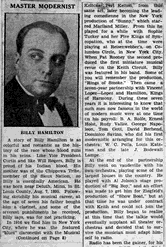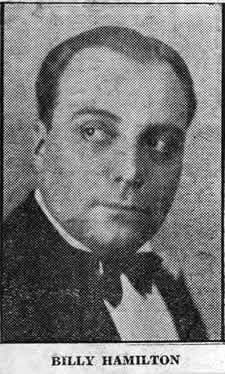
Master Control - 1929


Master Control - 1929
![]()
![]()
 A story of Billy Hamilton is as colorful and romantic as the history of the race whose blood runs in his veins. Like Vice President Curtis and like Will Rogers, Billy is proud of his Indian blood. His mother was of the Chippewa Tribe, member of the Sioux Nation, so Billy is essentially American. He was born near Deluth, Minn, in St. Louis County, Aug. 7, 1895. Following sketchily his musical career, at the age of seven his father bought him a clarinet, and some of the severest punishments he received, Billy says, was for not practicing.
A story of Billy Hamilton is as colorful and romantic as the history of the race whose blood runs in his veins. Like Vice President Curtis and like Will Rogers, Billy is proud of his Indian blood. His mother was of the Chippewa Tribe, member of the Sioux Nation, so Billy is essentially American. He was born near Deluth, Minn, in St. Louis County, Aug. 7, 1895. Following sketchily his musical career, at the age of seven his father bought him a clarinet, and some of the severest punishments he received, Billy says, was for not practicing.
In 1916 we find him in New York City, where he was the featured "blues" clarinetist with the Musical Keltons. Pert Kelton, from this same act, later becoming the leading comedienne in the New York production of "Sunny," which starred Mariland [Marilyn?] Miller. From this he played for a while with Sophie Tucker and her Five Kings of Syncopation, who at the time were playing at Reisenwebber's, on Columbus Circle, in New York City. When Pat Rooney the second produced the first miniature musical revue on the Keith Circuit, Billy was featured in his band. Some of you will remember the production, "Rings of Smoke." Then came a seven-year partnership with Vincent Lopez—Lopez and Hamilton, Kings of Harmony. During these seven years it is interesting to know that such men now famous in the world of modern music were at one time on his payroll: B. A. Rolfe, Ernest Holst, Rudy Vallee, George Napoleon, Tom Gott, David Berhend, Dominico Savino, who did his first modernistic arranging for this orchestra; W. C. Polla, Louis Katzman and the late J. Bodewalt Lampe.
At the end of the partnership Billy went on vaudeville with his own orchestra, playing some of the largest houses in the country. He played with Al Jolson's stage production of "Big Boy," and an effort was made to get him for Ziegfeld's production of "Show Boat," but at that time he was under contract with Keith and could not join the production. Billy began to realize at this time that the talkie would eventually supplant all theater orchestras and decided that to survive, the musician must adapt himself to radio.
Radio has been the gainer, for his programs from WBT and the Dixie network of the Columbia Broadcasting System have proven the master modernist that he is. Billy is of a quiet and unassuming disposition, a hard worker and a musician of infinite patience as well as skill. His modernists programs, featuring both his own and arrangements of other composers of the classics for the modern symphony, are awaited with expectation each week, for in each there is that unusual finish and finesse that is attractively peculiar to Billy Hamilton.